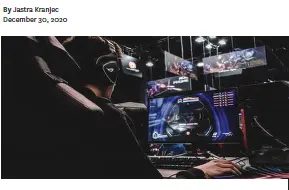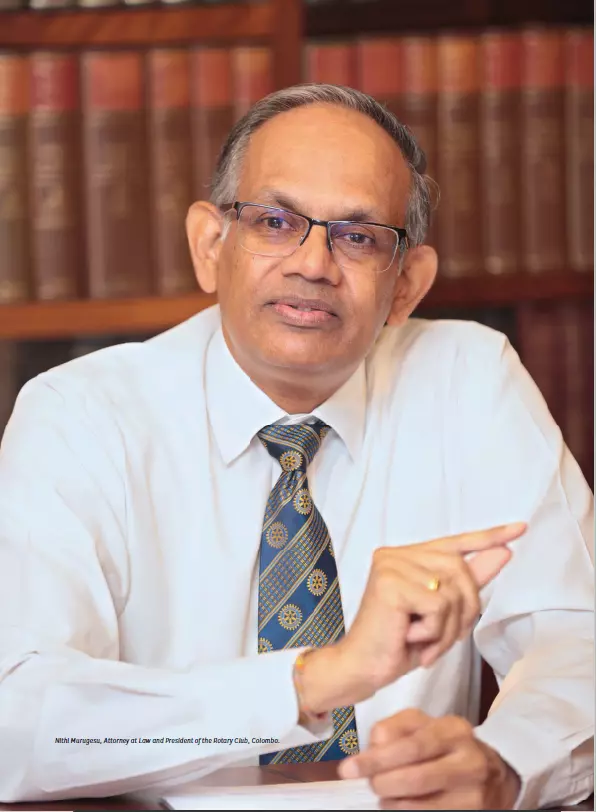
Prominent corporate lawyer, Notary Public and Commissioner for Oaths, Attorney at Law Nithi Murugesu is well-respected in the legal community and the general public. Having entered the profession 35 years ago, he followed in his father’s footsteps. Nithi Murugesu is the 92nd President of the Rotary Club of Colombo, which is the oldest and the largest Rotary Club in Sri Lanka. He speaks about the many services rendered by the Rotary Club and being part of a global community. Rotary contributed immensely to the elimination of polio in Sri Lanka and globally. The Rotary Club of Colombo continues in its journey to support communities and there are many projects that are on-going including support to curtail the spread of the COVID-19 pandemic.
By Udeshi Amarasinghe. Assisted by Swetha Ratnajothi. Photography Menaka Aravinda.
You are a distinguished lawyer. Can you tell us about your journey? I started my early education at Trinity College, Kandy where my father put me into the boarding when I was only five years and one month. I had a very good exposure being in the hostel and that life taught me to be independent, which included traveling to and from Colombo. Up to about Grade 5 the vehicle was sent, but after about Grade 6 there was no spoiling where we had to get into the train with our trunks. There were times when I arrived at the Kandy station and there were no porters and we had to carry our trunks all the way to Trinity College, which was a fair distance away from the Railway Station. After my O’ Level first attempt, which I failed, my father brought me down to Colombo and I repeated my O’ Levels at Royal College. Then, to complete my A’ Levels I went to S Thomas’ College, Mount Lavinia.
Failures are the pillars of success, I failed my A’ Levels at S Thomas’ and I had to do my A’ Levels again privately and believe me I passed only at the fourth sitting. I was not serious about my studies in that sense and suddenly it dawned on me that I must become serious in life. By that time, I had decided to do law. My father had a law firm already and in a sense it was easier for me to get into a ready-made practice. He had passed out as a lawyer in 1949 and joined the famous law firm F J & G de Saram, where he worked for 12 years and became a partner. In 1962 he decided to start his own practice by the name of Murugesu. The current Esufally family of Hemas Group, their grandfather was a client of F J & G de Saram. When he heard that my father was branching off and starting on his own he offered a space to my father at the Hemas Building, which was a tiny room. He said if my father could manage for the time being, he would provide a space on another floor as soon as there was a vacancy. He said that he will not remove any files that are already at the firm but will give my father all the new work and he was a great source of support to my father. My father went on to become the lawyer for the Hemas Group.
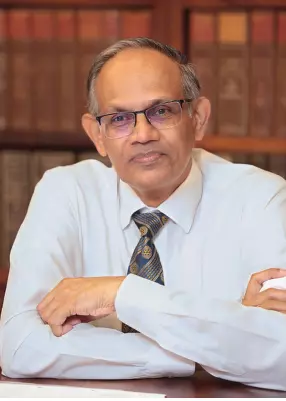
He occupied the Hemas building where he went through to the second and third floors. Then Mr V W Kularatne joined my father, and the firm became known as Murugesu and Kularatne. Thereafter once Mr Kularatne left the firm, it was once again known as Murugesu. Mr Neelakandan who later joined the Firm, happened to marry my sister. My father changed the name to Murugesu and Neelakandan. I joined the firm after I passed out as a lawyer in 1985.
Currently I am 35 years in practice. I was fortunate that my father had a law practice with a very good clientele. It was a very interesting journey so much so that in the firm apart from doing my Attorney’s at Law, whilst several of my batch mates and friends were going to England or Australia to do other higher degrees such as their Masters, Solicitors or Barristers, I continued to be at the firm and gained the experience.
I have no other qualification other than being an Attorney at Law. Subsequently of course I became a Notary of Public. The experience and being at the firm dedicated to the client’s cause gave me that exposure, and experience. After about 28 years in practice, my father having passed away in 2010, in 2012, I decided to branch off and start my own practice. From the law firm that was known as Murugesu and Neelakandan, I had 30 employees who came with me, which included six lawyers. We started the new firm under the name of Nithi Murugesu and Associates. The 30 employees have now increased to 40 and I have nine lawyers. I am proud to say that out of 40 employees, 21 (more than half) are females. I am fortunate that all the clients that I had, both individual clients and corporate clients, all moved with me and continued to support me by engaging my services. It has been eight years since I commenced my new law firm. It has been a very challenging and good experience and I have no regrets that I started on my own.
How did you join the Rotary Club having been involved in your work at the law firm?
During the year 2011, I was invited by Mr Tissa Bandaranayake, a leading Charted Accountant and a highly respected individual, a former partner of Messrs Ernst & Young Chartered Accountants who happened to be serving on the board of Nawaloka Hospitals as a director. My firm was handling their legal work and we were also their company secretaries. Mr Bandaranayake invited me to join Rotary. In Rotary you can join only through invitation. That is the good thing about Rotary. He invited me to join his club, which is the Rotary Club of Colombo in 2011. The Rotary Club of Colombo is the first club chartered in Sri Lanka in 1929. At the time of charter, the first inauguration meeting was held at the Galle Face Hotel. It was chartered by a famous gentleman from the USA known as John Wheeler Davidson and he chartered many clubs around the world. He chartered the Rotary Clubs of Bombay, Madras and Colombo in 1929, and a few clubs in New Zealand and Malaysia. All these clubs have been grouped together and call themselves the JWD clubs, this group was started quite recently. We tie up with these foreign clubs who are known as sister clubs and do many joint projects. That is my entry from law into Rotary. Currently, I am serving as the President of the Rotary Club of Colombo, which I assumed on July 1st, 2020 and my term will end on June 30th, 2021.
Can you tell us about the services rendered by the Rotary Club of Colombo?
As a Rotarian you get the opportunity to serve the community. In Rotary, there are five avenues of service and through four of them we do projects and they are called; community service, international service, youth service, and vocational service. In community service we do many projects, which help the community mostly in Sri Lanka. Sometimes we partner with overseas clubs when there may be a requirement to support needy communities both in Sri Lanka and overseas. For example, we have joined up with a club in the USA, to do a project in Vietnam for young girls. They need to be empowered and educated, because many girls go astray in that area of Vietnam. Through this project we are trying to help them. Rotary International was founded in 1905 and it is over 115 years in existence. The Rotary International then found that they need to have an arm to fund the projects. Therefore, they started what is known as The Rotary Foundation, where Rotarians contribute funds for which they are recognized. Recognition is given in this manner; when you contribute up to USD 1,000 you are known as a Paul Harris Fellow (PHF). Then when you go into the second level of another USD 1,000 you are known as a PHF plus one. You keep rising with USD 1,000 and when you contribute up to USD 10,000 you are known as a major donor. At USD 25,000 you become a second level major donor. It goes on in this manner. The highest point at which you can make a contribution is USD 250,000 when you are known as an AKS member, which means Arch Klumph Society member. Your photograph and that of your spouse is displayed at the headquarters of Rotary International in a place specially dedicated to AKS members. All the members of a club contribute for a year. In Sri Lanka we have about 70 clubs, all of them clustered together are known District 3220.
One club in the Maldives is also part of Sri Lanka. Therefore, Sri Lanka and the Maldives put together is one district. In India there are several districts because the country is so large. It is the same in the USA. When a district collects funds during a Rotary year, (July 1st to June 30th of the next year), that amount is contributed to the The Rotary Foundation. Then what happens is The Rotary Foundation deposits these monies, and after three years, returns half of the funds back to the district to use for their projects. Each club has to make a request to the District Governor saying that they have a project. For example, this year we obtained LKR 150,000 to place a cough booth for TB patients. We installed one last year at the Lunawa Hospital where it is difficult for people to come into the hospital because of the stigma attached to the disease. They have to use the washroom to discharge their sputum for examination. We have placed a separate cough booth outside, where they are able to go and give their sputum for examination and they are treated. We are trying to provide these cough booths in Maligakanda, and other places in Colombo where there is a high density of patients with TB. We applied for a grant from the district and the funds came from The Rotary Foundation, which was given three years earlier. Then, 25 percent is also given to the district as the District Designated Fund (DDF). If that is given to us we can use the DDF and ask The Rotary Foundation to match it. If we receive USD 5,000 from the DDF, The Rotary Foundation will match the USD 5,000. In effect the entire 100 percent comes back to the district up to three years where we can use the funds for our own projects. That is how contributions are made. We also reach out to corporate clients and individuals. Corporates have their CSR projects, which funds they divert and we implement projects in collaboration with them. These projects have to fall into focus areas such as disease prevention, mother and child healthcare, water and sanitation, economic development, literacy, and supporting the environment. Whatever the projects that we do whether it is done through community service, international service, youth service or vocational service you must fit it into one of these focus areas. The advantage of doing a project through Rotary is that you have the contacts, you are able to do projects with foreign clubs, and there is strong stewardship. The Rotary Foundation is so very careful with monies that are disbursed. Each club has to have proper minute books, and have regular meetings. The District Governor has to visit every club during his tenure and he will inspect all the books. Stewardship is given high priority in Rotary. People are very comfortable in disbursing funds to Rotary, because they know it will be used properly. The Colombo Club is the largest club currently having 117 members. All the other clubs have less than 100. We have honorary members, which include Ambassadors and High Commissioners. We have nine all together and this is also prestigious for our club. About five years ago we were fortunate that a member of the Rotary Club of Colombo, Mr K R Ravindran, the Chairman of Print Care, a public quoted company, became the first Sri Lankan Rotary International President. Currently he is the Chairman of the Board of Trustees of The Rotary Foundation, which disburses all the funds for projects. We are very fortunate to have him as a member of our club, which has brought great prestige and honour to our club as well as to our country. When a Rotary President visits any country around the world, at each meeting that he attends the Sri Lankan National Anthem has to be played. During his tenure he visited almost 95-100 clubs and had the privilege to have an audience with His Holiness the Pope and several Presidents and Prime Ministers of countries. During Mr Ravindran’s tenure as world President, the Chicago headquarters in Illinois had the Sri Lankan flag flying at full mast outside the premises. The premises is owned by Rotary International. Rotary also has a permanent non voting seat at the UN. Rotary was the pioneer in the effort to eliminate polio from the face of this earth with all their network. We were the first country in Asia to be polio free and that team was led by Rotary International President K R Ravindran. At that time a letter had to be written to the LTTE leader requesting to cooperate to lay down arms and that the Army too will lay down arms, for a ceasefire for about three days to permit everyone to administer the polio drop in every child so that Sri Lanka could become polio free and we were successful. Currently there are only two countries in the world, which are not polio free. It is Pakistan and Afghanistan and the reason being is that we do not have access to vulnerable militant controlled areas where you cannot go and administer these polio vaccines because of the various suspicions that they have.
Rotary has come forward and informed the Government and the Ministry of Health that we are also willing to assist the Ministry in the dissemination of the COVID-19 vaccine in the way that the Government thinks it is best through our network. The only difference between the polio vaccine and this is, the polio vaccine could be disseminated by anyone because it is merely putting two drops into the mouth of the child. When it comes to COVID-19 vaccine you need to have a qualified nurse to be able to inject the vaccine. Rotary also has two other programs known as Interact and Rotaract. Interact is for school children and Rotaract is mainly for university students and those who are just starting their careers, and thereafter you can become a Rotarian. Our club has sponsored six Interact Clubs and three Rotaract Clubs. We have almost 120 Interact Clubs throughout Sri Lanka and 5,000 plus Interactors and about 71 Rotaract Clubs with around 700 members. We have six Interact Clubs sponsored by our Club; which are Royal College, Bishops College, St Paul’s Milagiriya, Muslim Ladies College, Stafford International and a community based club called the Interact Club of Colombo, where children who do not have interact clubs in their schools and have formed themselves into this club. These school children get together in youth exchange programs too. There is a lot of interaction, and it gives them the opportunity to become themselves, develop speaking abilities, and build their confidence levels whilst doing projects. Then we have three Rotaract Clubs; the Rotaract Club of Colombo, which was the first club to be chartered in 1969. Then the Rotaract Club of Colombo Regent and the Rotaract Club of Kotalawela Defence University (KDU). They are very active, and are implementing many projects. They are very enthusiastic in their projects and there is fellowship as well.
Can you speak about the projects being implemented during your tenure?
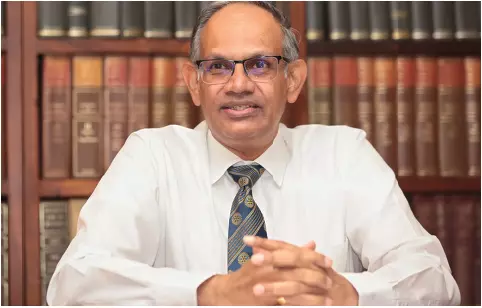
We have some projects that are ongoing. We started what is known as the Cancer Early Detection and Prevention Center in Narahenpita. It has been operational for the last 16 years. It is a service given free of charge to any member of the public to come and have themselves examined. We had over 80,000 people examined in those 16 years, and about 40 percent found to be requiring further investigation and treatment if necessary at the National or private hospitals. We have been upgrading the equipment and the Center is in partnership with the Ministry of Health. We started another project with the Ministry of Health and in partnership with the Rotary Club of Birmingham in Alabama, USA where we are receiving one of the largest grants. We are installing a LKR 50 million worth sophisticated Cobas machine and accessories for the examination for elimination of cervical cancer from Sri Lanka. The target like polio, is for Sri Lanka to be the first country to be cervical cancer free. The Ministry of Health has already started the program, and they are immunizing school children, that is girls of certain ages. The equipment is due to arrive at the end of January 2021. We have placed the order through the Hemas Group and it will be installed at the Anuradhapura Teaching Hospital. That is one ongoing project.
With the Rotary Club of Kensington Flemington in Australia, we have started a project where playground equipment is being harvested by them and put into containers at their cost and shipped to Sri Lanka. We have been clearing the containers and already donated around 25 playgrounds in the rural areas, and installed in schools and in public places for the children. That is also an ongoing project. Five containers have already arrived in Sri Lanka with subsequent consignments arriving in the country soon. It is a pleasure to see these children enjoying playing in the playground. The water sanitation projects are ongoing as well. One is cleaning the existing wells in the Northern area particularly Kilinochchi, which have been contaminated due to non-use and due to the war situation. This project is being implemented with the Farham Rotary Club in the UK. We are cleaning about 20 wells. A project by the name of “Well Done” was already completed. We are now into phase two called “Well Done Two”.
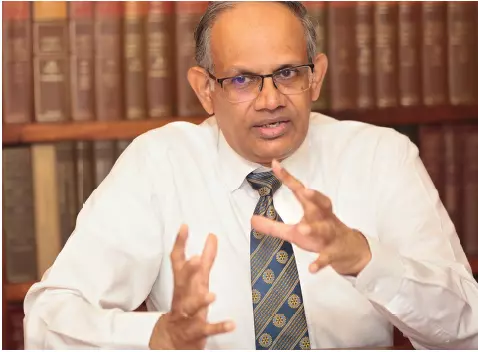
We also provide RI (reverse osmosis) water purification plants in the Polonnaruwa area, which is the most affected in terms of water contamination. We are providing these RO plants, where we receive global grants and foreign club donations. We have installed about 25 such plants, in the Anuradhapura, and Polonnaruwa districts giving children and the villagers clean drinking water. We are having a system where someone manages it. We do it through temples or schools because there is better management of the Plant. If we give it to other public areas we make sure that there is a responsible person to manage it. We are also currently doing primary school building projects with a club in Japan. We are receiving funding to build classrooms from Grade 1 to Grade 5. Those schools are from rural areas, secondly they are Government schools, and thirdly they only have up to primary level classes. With the Japanese club aid we are building brand new classrooms at our cost. The project costs about ten million rupees for each school. Currently, we are building two schools in the Homagama area, which will be completed very soon.
We have some ongoing projects for example in Maskeliya, known as the “Tea Leaf project” where we are training teachers to teach English to children after school hours. With the permission of The Rotary Foundation who provided funds along with another foreign club, we used the excess funds to purchase a Leyland bus, and converted it into a mobile library. The bus keeps going from place to place on a designated day, and the children are ready, knowing that the bus will come at a particular day and time and it will remain there for about two to three hours for them to use the library and select their books. We implement smaller projects such as giving computer equipment and multimedia projectors to schools, which are all through donations of club members. We did a major project in terms of publishing all the protocols of the COVID-19 safety health guidelines in all three languages. The guidebook has all the possible sectors from day care centers to public meetings, shops and mobile vendors to much more, and all the practices that need to be adopted by each of these sectors. The guidebook has been done in all three languages and presented to the Ministry of Health and they in turn have been distributing these to the PHIs all over the island, who can in turn educate the public. At the time the COVID-19 pandemic started the entire Rotary District organized themselves into a taskforce headed by Past Rotary International President K R Ravindran. We received donations from all over including large corporates in Sri Lanka. We bought one of the most sophisticated PCR testing machines, which was handed over to his Excellency the President and now installed at the Medical Research Institute (MRI), which can do up to 1,000 tests per day. We donated test kits as well. We had some excess funds and when the Government turned the Neville Fernando Hospital into a COVID-19 Center, they were short of mattresses and pillows. We immediately procured 200 each of mattresses, pillows, bed sheets and pillow covers. Within three days we had it delivered to the Neville Fernando Hospital to immediately turn it into a COVID-19 center. We received a donation of 114 ICU beds from the Rotary Club of Kensington Flemington in Australia. We did a ceremonial handing over of the 114 ICU beds and mattresses to the Hon State Minister Dr Sudarshini Fernandopulle to be given to the required hospitals. The international service, which is one of the four avenues of service, provides many benefits where we make contact with foreign clubs and groups. We have a Rotary Exchange Fellowship program where Rotarians go and stay at the homes of overseas Rotarians and when they come to Sri Lanka they stay with Rotarians in Sri Lanka. There is bonding and building of contacts. Therefore, when a certain project is required to be implemented they will ask us to partner with them or we request them to partner us. This particular year for vocational services, we have identified three minor staff from three hospitals that is the Ragama Hospital, one other hospital in Colombo and the Medical Research Institute. These are minor staff who are involved in disposal of medical waste and are exposing themselves to COVID-19, but they are still working tirelessly. We recognize such people and we give them an award and a cash prize. We have identified three minor staff and in the month of January 2021, we hope to visit them and present a token of appreciation and cash grants to encourage them in their vocation.
You are known as one of the top corporate lawyers and you are engaged in social service. But you hardly find lawyers providing such service since they are very busy. What are your thoughts?
Yes, that is true because they are busy people. But, of course in our club we had the Past District Governor, Mr D M Swaminathan, a respectable lawyer, who is still a member of our club and in completing 50 years in the year 2021, and we have some other lawyers as well. Mr Simon Senaratne, who is the partner of Simon and Associates, completed 50 years as a Rotarian. He joined the Rotary Club of Colombo North way back in 1970 and completed 50 years and so there are quite a number of senior lawyers who have joined the Rotary movement and given of themselves.
You hold other positions as well?
Yes, I am also currently a Director of BMICH, which is headed by Madam Chandrika Bandaranaike Kumaratunga. I have been a Director for the last five years and it is an appointment by His Excellency the President and with the change of the Government too, His Excellency has kept the current board members. These responsibilities too keep me occupied. One of the nicest things my father taught me was more than the profession about human values and life. My father was an ardent follower of a great sage in Pondicherry known as Sri Aurobindo. Sri Aurobindo was a classical tripos from Cambridge University. He was sent to England with his brothers at the age of five, studied at the King’s College and in Cambridge University. There are altogether 30 volumes all in English of his writings on various subjects. He was the Principal of the Baroda College in Calcutta, and while he was there, he was taken into custody by the British on the basis that he was involved in the murder of a British national, which was a false charge. He was kept in the Alipore Jail for one year after which he was acquitted. A famous advocate known as Sir Chittaranjan Das spoke on his behalf and when he was acquitted, the judge who heard the case (and Sri Aurobindo were actually batch mates at the Cambridge University) stood up and apologized and requested to please accept His Majesty’s apology for keeping Sri Aurobindo incarcerated for a year without any proof. This case is reported in the “Famous British Trials” volumes, which is available at our Law College Library. After Sri Aurobindo was released, the British were still after him because he was involved long before Mahatma Gandhi in the freedom movement of India all through his writings. He thus moved to Pondicherry, which was a French Colony, where the British could not have any access. The people gathered around him and a little ashram started, which is now known as Sri Aurobindo Ashram in Pondicherry. A township known as Matrimandir in Auroville was also started. There was a lady known as Mirra Alfassa, who was French. Her husband and her visited the French colony of Pondicherry, where she met Sri Aurobindo and she felt the need to be there. She became the spiritual collaborator of Sri Aurobindo and later she was known as the Mother. After Sri Aurobindo shed his physical sheath in 1950, the Mother continued to run the ashram till 1973. The Pondicherry Ashram is still run by Trustees. My father started reading Sri Aurobindo’s writings in the early forties and he soon felt that he should disseminate the knowledge of Sri Aurobindo and Mother’s writings as well. He bought a plot of land in Wellawatte, and constructed a four story building, which houses a library, and is open to students of O/level and A/level to come and study free of charge. We provide water, electricity and toilet facilities. Sometimes the place is full, so we have to accommodate the students with additional tables on the higher floor because we provide a place where we do not permit the use of mobile phones or newspaper reading. So it is a quiet place for them to come and study. Many parents feel very comfortable to send their children to the Center to study. It is one of the services that my father was doing for everyone. There is a meditation hall, which has the relics of Sri Aurobindo enshrined. There is an auditorium in the building and there is a Montessori, which is run by my sister. The current Chairman of our Board of Trustees is Mr Menaka Wickramasinghe the former Chairman of Ceylon Biscuits (Manufacturers of Munchee Biscuits) who was also taken up a lot by the writings of Sri Aurobindo. Sri Aurobindo’s philosophy does not interfere with the practice of one’s own religion. There is no religious flavor in Sri Aurobindo’s teachings. I am also a Trustee on the Board of the Sri Aurobindo Centre in Sri Lanka.
How do you balance your legal profession and other duties?
I must say that this year has been very challenging, having to balance my professional work with Rotary. Fortunately in our club we have a very good committee structure. We have a good board of directors, who are in charge of administration and a Director of Services under whom, the four avenues of service comes. We have a Director Foundation to collect funds, Director Membership for the growth of the members and the fourth one is Director Public Image that looks into the publicity for the projects that are done so that people will get to know about Rotary. There are many people who do not know about the work that we do, even the fact that we were involved in eliminating polio. Of course all credit goes to my wife Ashwini for her unstinted support – without family involvement all this is not possible
What can we expect from the Rotary in 2021?
Rotary is very focused in community development and disease prevention, mother and child healthcare, water sanitation, economic development, literacy and environment. The next President will be having projects year marked and she will be raising the funds and have a line of action by appointing her own committee. It continues in that manner. We have about three Presidents lined up and that is how we function so they will start preparing for their years ahead. We have what is known as a training session for President Elects. This time we had it in Nuwara Eliya, where the District Governor chartered a whole train, which took all the Presidents from all clubs from Colombo to Nanu Oya and then we took a bus to Nuwara Eliya and we stayed there for two nights and three days. All the Club Presidents were given full training before taking office on various aspects of stewardship, club management and so on. Similarly, District Governor Elects are sent overseas to the US for training and this year because of COVID-19, they had a virtual training session. There is great emphasis and focus on proper management and stewardship in Rotary. The fellowship is one of the great advantages of Rotary and we get to meet up with other clubs, other Presidents and we do joint projects with them, as well.



